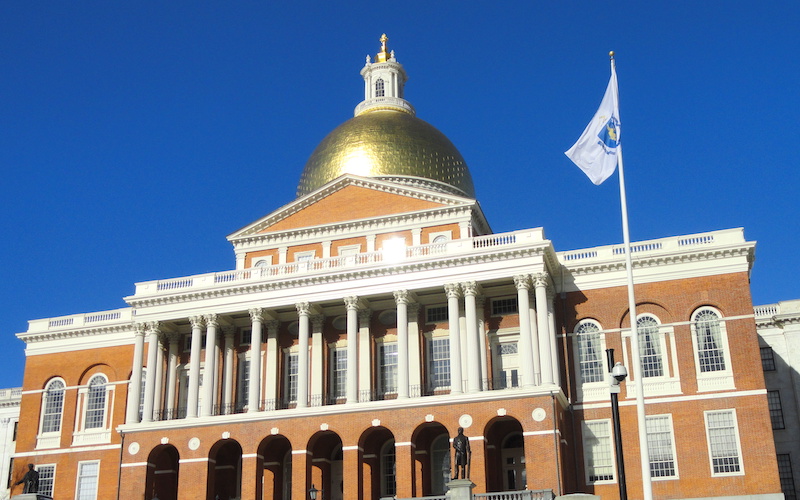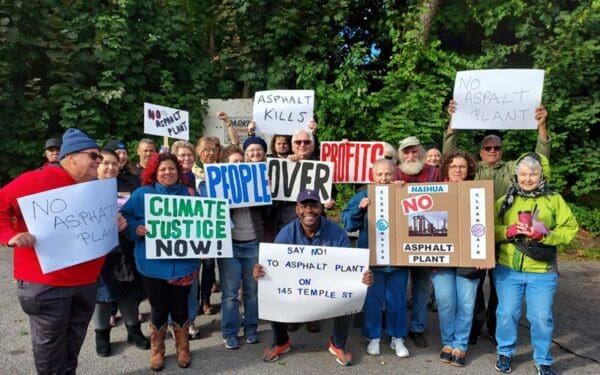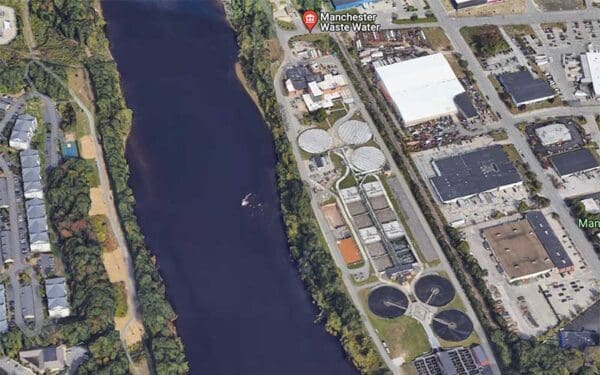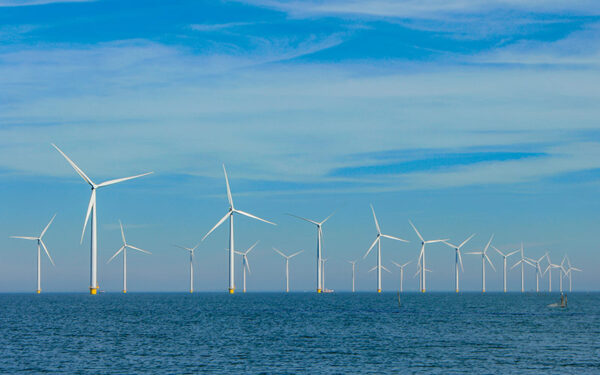
This report card supports our push for state decision-makers to urgently implement the climate law, now. Photo: Wikimedia Commons.
We all know what it’s like to bring a report card home from school. There’s the unbridled joy of receiving a good grade and the gut-wrenching feeling of getting a bad one. What we haven’t necessarily experienced is our entire state receiving a report card. But we just got one in Massachusetts, and it’s a mixed bag.
Published by the state’s Office of Climate Innovation and Resilience, the “Massachusetts Climate Report Card” measures the state’s progress in lowering carbon pollution to net zero by 2050.
It shows we’re making progress in some areas, like in the number of electric vehicles on the road. But it also reveals we’re far from reaching the 2030 goals that keep us on track to our ultimate 2050 targets. We’re talking about our future here – slowing the climate crisis. So, we’re distilling what the Climate Report Card says – and proposing concrete solutions that can get the state back on track and raise its grades.
Electric Vehicles and Improved Public Transportation: Needs Work
What’s at stake: The cars, trucks, tractor-trailers, and other vehicles clogging our roadways release a lot of air pollution. In fact, transportation produces more carbon emissions than any other sector in the state.
Progress:
|
|
Current Status |
2025 Benchmark |
2030 Benchmark |
|
Registered Electric Cars |
70,000 (as of 2022) |
200,000 |
900,000 |
|
Public Charging Stations |
6,436 (as of 2023) |
15,000 |
75,000 |
What we’re advocating for: While the state exceeded its goal of 60,000 registered electric cars by 2022, we have a long way to go to meet the 2025 and 2030 benchmarks. Additionally, the state was mum on progress in boosting public transportation – an essential component in slashing climate-damaging pollution. That’s why CLF is pushing the state to:
- Accelerate the deployment of electric rail trains while phasing out diesel-powered (commuter rail) trains,
- Improve the accessibility and reliability of buses by updating their routes,
- Improve the accessibility and reliability of subways by establishing a plan for track repairs and eliminating slow zones,
- Improve the accessibility and reliability of trains so Massachusetts residents can commute without needing a car,
- Promote biking infrastructure and pedestrian safety and accessibility.
Electric Buildings and Energy Efficiency: Needs More Work
What’s at stake: The way we heat our buildings relies heavily on fossil fuels. So, our homes, apartments, and businesses must be part of the climate solution. That includes electrifying our heating through heat pumps and making our buildings more energy efficient.
Progress:
|
|
Current Status |
2025 Benchmark |
2030 Benchmark |
|
Heat Pump Installation |
29,721 (as of 2023) |
100,000 |
500,000 |
|
Home Energy Audits |
89,970 (in 2022) |
No benchmark |
No benchmark |
|
Home Weatherproofing |
40,446 (in 2022) |
No benchmark |
No benchmark |
What we’re advocating for: Right now, the state isn’t close to meeting its heat pump mandates. Additionally, it’s difficult to evaluate progress because the two energy efficiency solutions assessed in the report card – energy audits and weatherproofing – lack benchmarks. However, given that barely 9,100 weatherproofing projects were for low-income residents (just under 23% of the total completed in 2022), the state must provide residents with better access to Mass Save, especially low- and moderate- income populations. CLF is pushing for:
- Empowering cities to reduce fossil fuel use by creating a new Net Zero Communities program, which would allow them to implement stricter energy and building standards than state standards.
- Incentivizing the upgrade of both new and existing buildings to electric heating between 2024 and 2030.
- Making electric heat pumps, energy efficiency, and weatherproofing programs affordable and accessible for everyone – including low and moderate-income families and renters.
Clean Power: Needs More Work
What’s at stake: We must stop generating electricity from fossil fuels, like natural gas, and instead move towards renewable sources like solar and wind. Our power can’t contribute to the crisis we are trying to fight.
Progress:
As of 2021, Massachusetts is generating just over 48% of its electricity from “clean” sources, which it classifies as wind, solar, hydropower, and nuclear.
|
|
Current Status |
2025 Benchmark |
2030 Benchmark |
|
Wind Power |
113 megawatts (as of 2022) |
180 megawatts |
3,650 megawatts |
|
Solar Power |
3,325 megawatts (as of 2022) |
4,470 megawatts |
8,360 megawatts |
What we’re advocating for: CLF is asking the Healey administration to cut climate-warming emissions from electricity generation by:
- Imposing a requirement on electric companies to reduce the demand for electricity by 50% during peak usage hours by 2025.
- Restoring and strengthening the state’s nation-leading clean energy standards so that biomass-generated electricity – which is not clean – is not eligible for government-funded financial incentives.
- Calculating climate-warming emissions from hydropower so we can ensure we’re accurately counting progress toward our state’s climate goals.
Protecting Natural and Working Lands: Good Progress
What’s at stake: Farmlands, wetlands, and other environments can soak up carbon like a sponge and store it instead of releasing it into the atmosphere (where it would warm the planet). For this reason, we must restore and protect these lands so they can continue doing their job.
Progress:
|
|
Current Status |
2025 Benchmark |
2030 Benchmark |
|
Land Permanently Protected |
27% (as of 2022) |
28% |
30% |
What we’re advocating for: The state is on track to meet its 2025 and 2030 benchmarks. CLF is pushing to strengthen this progress by ensuring environmental permitting approval processes for construction do not increase carbon pollution. We’re also focusing on not further harming people already shouldering most of climate change’s impacts.
Climate Adaptation and Resilience: Some Progress, Needs More Work
What’s at stake: Climate change is here now. A study published in September 2023 found that extreme weather linked to climate change cost the world $260.8 billion in property damage, death, and other costs. This same study estimates that climate change-related damage is going to cost the world 1.7 trillion to 3.1 trillion annually by 2050. In Massachusetts specifically, higher temperatures and rainfall are expected to cost local governments increasingly more every year in repairs to damaged infrastructure, delays in public services, road maintenance, and more.
That’s why our efforts need to both slow the crisis AND make sure we can withstand the impacts we experience today – like heavier rainfall, increased flooding, and other weather extremes.
Progress:
|
|
Status |
Benchmark |
|
State resilience-related funding |
Just under $90 million for July 1, 2023 through June, 2024 |
No benchmark |
|
State agencies that have assessments of how climate vulnerable their assets are |
88 out of 92 agencies |
All 92 agencies by 2026 |
|
% of the state’s Climate Resilience Plan in progress |
69% in progress or in development |
100% by 2026 |
What we’re advocating for:
- Ensuring our electricity infrastructure can withstand extreme weather and climate impacts so all Massachusetts families have access to reliable power when we need it the most.
- Only approving installations of electric vehicle charging station that will withstand climate stressors, like extreme weather.
- Requiring utility companies to submit plans showing how they will implement climate adaptation strategies and protect their infrastructure from extreme weather.
Environmental Justice: Needs More Work
What’s at stake: Low-income communities, residents of color, those with limited English proficiency, and other historically disenfranchised populations bear the brunt of pollution and climate disasters. This is no coincidence, resulting from centuries of racist and classist policies that have stalled and continue to stall environmental progress in our country.
Progress: In 2023, the Healey administration created the Office of Environmental Justice and Equity to develop a strategic plan to:
- Advance an equitable transition to clean energy.
- Protect environmental justice communities from harm.
- Ensure we all have access to the natural resources we deserve, such as clean air, water, and agricultural resources.
The agency has also built a network of stakeholders from across the state to guarantee that those shouldering the worst of climate change get a say in shaping the policies affecting their lives.
What we’re advocating for: We need updated policies and measures prioritizing the needs and voices of those who have suffered and still suffer the most from our polluting energy infrastructure. To get there, we need an overhaul of the procedures determining the location of energy facilities and its infrastructure including:
- Reviewing how energy infrastructure placement is decided, especially within environmental justice communities .
- Providing a clear path to how communities can weigh in on proposed facilities, including removal of barriers preventing people from doing so – like improving language access and methods for seeking public input.
- Ensuring appropriate review of environmental justice impacts raised during the construction and maintenance of facilities.
- Accounting for critical concepts like how multiple climate threats can combine and create worse impacts, community participation and engagement, what should count as alternative sites for construction, resiliency, and climate-damaging emissions.
What Comes Next
As we embark on this new year, it can be easy to forget that 2025 is only one more year away – and 2030 only six. We simply don’t have time to delay our clean energy transition.
CLF urged the administration to speed up climate action with our roadmap in early May 2023. Clearly, this report card shows that Massachusetts has done some good work on climate. But just like grades from school push us to study harder, this report card shows us that we need to step up on climate to meet our targets and slow the crisis.




